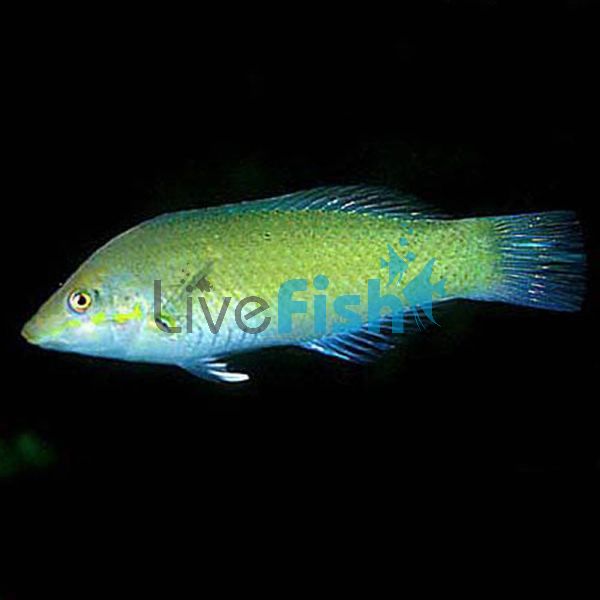Pastel Green Wrasse MED
This attractive wrasse is easily recognised by its pastel green colouration. Its temperament can vary depending on age so they are a great challenge for an experienced aquarium owner.
These fish are pale greenish in colour with the females displaying small dark spots whereas the males have pink ones. They have irregular green and pink bands located on the front part of their bodies.
No success has been had when attempting to breed this species in captivity although they have been known to spawn.
The Pastel Green Wrasse will bury itself in the sand bed when frightened. When first added to the tank it will more than likely stay buried for the first few days until it feels comfortable enough to come out. Once established this species of wrasse is famous for going to sleep in the sand bed and waking up at the same time every day.
This species is originally from the Indo-West Pacific ocean area ranging from the Great Barrier Reef to the Philippines. They will normally inhabit protected shallow reefs that have sandy areas and have been found at depths down to 30 metres.
Tank Recommendations for the Pastel Green Wrasse
The smallest tank size for this species is 230 litres and they are best suited for fish-only aquariums due to the frequent sand burrowing which can easily be clouded into the water column and settle on top of corals. You should provide a fine sand bed of at least 10 cm (4 inches) deep and well as small pieces of rock which the wrasse can use to play hunt with. Plenty of open swimming area should be available along with rocky crevices for it to hide.
Suitable Tank Buddies
This species is peaceful when young, but as it progresses into adulthood it may decide to pick on smaller tank buddies. It may also bully other members of the same species, therefore take care to only pair it with other peaceful but larger species.
Usually Compatible
These fish will get along great with large Angelfish, Boxfish and even Damselfish. Tangs and Fancy Damselfish would also make great options as tank buddies too.
Sometimes Compatible
Take care if attempting to combine them with Dwarf Angelfish, Frogfish and Blennies. Butterflyfish, Cardinalfish and Clownfish should be approached with caution as well. Eels, Dragonets and Groupers can sometimes be problematic too. Other species such as Pufferfish, Snappers, Parrotfish and Rays can be housed together also as long as you're careful.
Rarely Compatible
This wrasse will actively move around live coral and nip and pick at small invertebrates and crustaceans. Sharks should also be avoided. Batfish will cause problems as well. Smaller more docile species such as Seahorses and Pipefish will be too frightened and may get bullied.
Feeding your Pastel Green Wrasse
These fish are carnivores and in the wild will survive on a varied diet of meaty foods. You should provide it with options such as frozen mysis, chopped squid, clams and scallops as well as other marine-based meat frozen and fresh foods. Feed them twice daily but only enough that they will consume in one sitting.
| Scientific Name | Halichoeres Chloropterus |
|---|---|
| Care Level | Moderate |
| Common Names | The Pastel Green Wrasse is also known as the Green Coris Wrasse and the Green Wrasse. |
| Diet | Carnivore |
| Fish Family | Labridae |
| Lifespan (years) | 4 |
| Max. Length (cm) | 20 |
| Min. Tank Volume (l) | 230 |
| Origin | Indo-West Pacific |
| Reef Safe | No |
| Sociability | Semi-aggressive |
| Venomous | No |
| Water Conditions | 23-27° C (74-82° F), dKH 8-12, pH 8.0-8.5, sg 1.020-1.026 |




